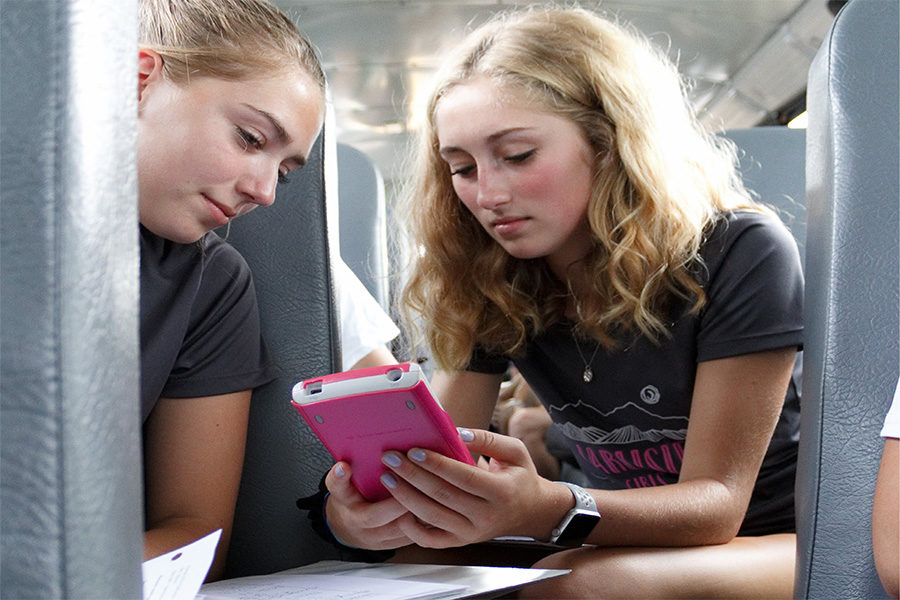Alyssa Dyson and Mia Fry doing their homework on the bus that is taking them to an away meet. Students have to use every spare minute of their time in order to complete school work when going to their sporting events.
Trying to do it all (Editorials)
October 17, 2018
Teenagers frequently find themselves in a bind: how can we get everything done in the time we have available while also participating in sports, extracurricular activities, jobs, and finding time for family and friends? Check out our two editorials about finding the balance in teenage life.
Teenage workload: Should we cut back? (Editorial)
Across the nation, teenagers work hard to do well in school, excel in athletics, have a job, and participate in extracurricular activities. Between homework, job hours, and trying to decide on future plans, teenagers have little to no downtime. There is too much on teenagers plates for them to finish it all. Some teens need to make more time, and some need to drop a few activities.
But is this actually possible?
Teenagers are no strangers to late nights; in fact, they are expected. Many teenagers are up until midnight if not later on a regular basis. Homework alone keeps many kids busy well into the night, but when athletics and a job are thrown into the mix, hours slip by.
College is expensive, and many teens are saving up in hopes to avoid as much debt as possible. Some get no financial aid from their parents or the state, so they are on their own to pay for it. They need a high paying job with flexible hours in order to balance everything.
CHS junior Mia Fry works at Brusters after cross country practice on many weekdays and on weekends.
“Sometimes [having a job] can be nice because it really forces you to manage your time, but other times its hard because you barely have time to do homework and you have little free time,” said Fry.
In order to get into a good college, you need extracurricular activities on your transcript, and you need a lot of them. Standing out will help with acceptance into schools with very competitive acceptance rates. Many teenagers attempting to get into prestigious schools fill their time with extracurricular activities and it usually has negative health effects.
In an article by Jenny Anderson, a writer for Quartz (an online newspaper), looking at extra-curricular activities, she explains the negative health effects, “Those include more emotional problems, less sleep, and higher stress levels than those doing fewer activities.”
Along with packed afternoons, students have early mornings. Many students get up anywhere from 5:30 AM to 6 AM in order to get ready for school and eat breakfast. That amounts to a whopping 18 hour day! For some students in high-level classes and many extracurricular activities, the day is even longer.
In an article written by Craig Canapari MD, he cites a colleague’s work, “Lauren Daisley had a great video on CBS Sunday Morning several weeks ago discussing early school start times. Sleepiness in teenagers is a major public health issue and early school start times contribute to this.”
Stress levels and sleep deprivation are not all teenagers have to deal with, and the list is mounting. Time is something that we just do not have enough of.
There is a solution to the lack of time. Many teenagers do not know their limit. Taking away a few activities will give teens the extra time they need to sleep and finish homework. It will alleviate some of the stress of daily life and improve the overall attitude of teenagers.
Disclaimer: Articles designated as “Editorial” represent the views and opinions of the author, not the 2018-2019 Periscope staff, CHS/CASD administration, or the CHS student body.

Kathleen O’Neill is currently a senior at Carlisle High School. This is her third year as a Periscope staff member. In the past, Kathleen has written...
Away games: Student-athletes forced to choose between sleep and school (Editorial)
The topic of sleep is a joke among the average high school student. While juggling extracurricular activities, homework, and family affairs, many students find it difficult to reach the daily recommendation of 8 to 10 hours of sleep.
Sports are often a reason to why students are unable to achieve the adequate amount of sleep each night. Student athletes do not return home after traveling until unreasonable hours making it nearly impossible to receive a healthy amount of rest each night. To help accommodate students, policies should be adopted to allow student athletes to come to school later when traveling far distances.
Students are often forced to prioritize their school work over their sleep schedule. Sleep is important for students but especially for athletes. Many athletes stay up to unreasonable hours to complete their school assignments. The Foundation for Global Sports Development states, “Sleep-deprivation leads to fatigue, which can cause a decrease in both academic and athletic performances.”
According to the National Sleep Foundation, a measly fifteen percent of students receive eight and a half hours of rest each night. The issue of sleep becomes an even bigger dilemma when students return from sporting events in the evening.
Carlisle High School student-athlete Arianna Line said, “When traveling a far distance, athletes should be allowed to come into school later so they have enough time to complete homework and receive the recommended amount of sleep.”
Some school districts across the country have taken into consideration the needs of their student-athletes. These particular schools have incorporated policies allowing sports teams who travel long distances during the school week to return to school the following day a few hours later than the standard arrival times. The system allows athletes to have the same allotted time period to complete homework while also giving them a sufficient amount of time to rest.
Student-athletes at CHS are often faced with many challenges due to their extracurricular activities. By incorporating similar policies, students will have an easier time becoming successful in and out of the classroom.
Disclaimer: Articles designated as “Editorial” represent the views and opinions of the author, not the 2018-2019 Periscope staff, CHS/CASD administration, or the CHS student body.

Dyamond Jones is currently a senior at Carlisle High School. She is a member of National Honors Society and National English Honors Society. She loves...

Sarah Rendon • Oct 29, 2018 at 10:42 am
Allowing student athletes a late start could be very beneficial to their overall health and success in school. I’m not sure how it should be implemented, but it’s a good idea.
Ellie Krebs • Oct 26, 2018 at 9:07 am
As a student athlete I agree with this article. I know during lacrosse season I especially feel this and I feel like the days are extra long. Also, sometimes the hardest decision of a day is if I should sleep on the bus or do my homework.
Delaney Mullen • Oct 24, 2018 at 3:20 pm
This article brings up a lot of valuable ideas in terms of the work load and time management of students. I agree that the stress of getting into a prestigious college leads many students to feel they need to be involved in multiple extracurricular activities that also create more stress by taking up more time. I run cross country and take AP classes so adding a job on top of that makes things even more difficult and often it feels like there needs to be more hours in the day to accomplish all the necessary tasks.
One solution of this I believe it would be more than beneficial for teachers to cut down on homework that is given to students. Allowing students to have more down time might even be a positive approach as less stress may lead to higher test scores due to feeling less pressured.
Armela Ferhatovic • Oct 24, 2018 at 9:14 am
I definitely agree that teenagers have to much to handle. Students try to balance school, work, and extra curricular activities. I have experienced that myself I have school and then class until 4pm. Then after class I have work. I often find myself staying up late to do homework and getting very little sleep.
Abbey Birely • Oct 23, 2018 at 12:24 pm
For the average student we honestly dont enough for everything and we are trying to juggle social, school, family, and extracriculars.
I am a dancer at CPYB and my dance schedule is over 27hrs a week and can go from 9am- 6:30 on a Sat and till about 9:15 during the week. And with school on top of it , I dont have time for a job.
I know the excessive amounts of homework that students are given, but its gotten better through the years I’ve spent here. But there have been nights that i havent gone to bed until about 2am working on school work etc.
So having that earlier start time is hard for those of us who go late in the night and who don’t have a lot of time for anything else.
Jacob Morris • Oct 23, 2018 at 8:13 am
I agree with the effort to resolve the intense workload on high school students who seem to “do it all” , but I believe there is a more effective approach. It is just as important for high school students to try and maintain a schedule of sleep as it is to get the recommended hours. I think that reducing the homework load as a whole will allow for less stress and pressure for students to have to juggle constantly. Plus schools across the Atlantic abide by these methods and seem to increase their international test scores to surpass American adolescent test scores.